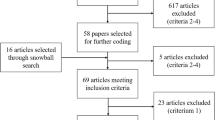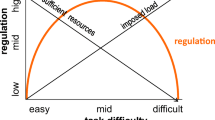Abstract
Almost anything worth doing takes effort, so it is no surprise that effort has played such a central role in how researchers, theoreticians, instructors, and even students think about student learning and achievement. In this special issue, the authors of the target articles explore the importance of effort to students’ self-regulated learning within multiple domains. To further support research progress on effort, we distinguish between objective effort as a direct causal agent of learning gains and effort as a student perception. We argue that understanding effort as a student perception shows promise for discovering ways to improve self-regulated learning and student achievement. In developing these arguments, we consider the contribution of the target articles to five themes relevant to metacognitively driven self-regulated learning, with the aim of fostering progressive research programs aimed at revealing the potential roles of effort in student achievement.
Similar content being viewed by others
Notes
Lay use of the term effort (“conscious exertion of power: hard work; example, a job requiring time and effort,” Merriam-Webster, n.d.) would imply the same—that is, more effort is indicated by working harder and not simply by working longer. Even so, students may say that they are using more effort when they use more time, and we return to the role of time in students’ perceptions of effort in the next section.
This claim is apparent from Bjork and Bjork (2011) who define desirable difficulties as “better conditions of learning that, while apparently creating difficulty, actually lead to more durable and flexible learning” (p. 58), making it clear that it is the conditions that are desirable—not the difficulties per se.
References
Note: The target articles are not currently in references, and to complete the commentary, we will need page numbers for all quotations.
Bjork, E. L., & Bjork, R. A. (2011). Making things hard on yourself, but in a good way: creating desirable difficulties to enhance learning. In M. A. Gernsbacher, R. W. Pew, L. M. Hough, & J. R. Pomerantz (Eds.), Psychology and the real world: essays illustrating fundamental contributions to society (pp. 55–64). New York, NY: Worth Publishers.
Bjork, R. A. (1994). Memory and metamemory considerations in the training of human beings. In J. Metcalfe & A. Shimamura (Eds.), Metacognition: knowing about knowing (pp. 185–205). Cambridge, MA: MIT Press.
Cowan, N. (1995). Attention and memory: an integrated framework. In Oxford Psychology series, No. 26. Oxford: Oxford University Press.
de Bruin, A., Dunlosky, J., & Cavalcanti, R. (2017). Monitoring and regulation of learning in medical education: the need for predictive cues. Medical Education, 51(6), 575–584.
DeShon, R. P., Brown, K. G., & Greenis, J. L. (1996). Does self-regulation require cognitive resources? Evaluation of resource allocation models of goal setting. Journal of Applied Psychology, 81(5), 595–608. https://doi.org/10.1037/0021-9010.81.5.595.
Dunlosky, J., & Ariel, R. (2011). Self-regulated learning and the allocation of study time. In B. Ross (Ed.), Psychology of Learning and Motivation (Vol. 54, pp. 103–140).
Dunlosky, J., & Mueller, M. (2016). Recommendations for exploring the disfluency hypothesis toward establishing whether perceptually degrading materials impacts performance. Metacognition and Learning, 11(1), 123–131.
Dunlosky, J., & Tauber, S. K. (2014). Understanding people’s metacognitive judgments: an isomechanism framework and its implications for applied and theoretical research. In T. Perfect & D. S. Lindsay (Eds.), Handbook of applied memory (pp. 444–464). Sage: Thousand Oaks, CA.
Ericsson, K. A., & Simon, H. A. (1980). Verbal reports as data. Psychological Review, 87(3), 215–251.
Janes, J., Dunlosky, J., & Rawson, K. A. (2018). How do students use self-testing across multiple study sessions when preparing for a high-stakes exam? Journal of Applied Research in Memory and Cognition, 7(2), 230–240.
Kahneman, D. (1973). Attention and effort. Englewood Cliffs, N.J: Prentice-Hall.
Kalyuga, S., Renkl, A., & Paas, F. (2010). Facilitating flexible problem solving: a cognitive load perspective. Educational Psychology Review, 22(2), 175–186.
Kalyuga, S., Ayres, P., Chandler, P., & Sweller, J. (2003). The expertise reversal effect. Educational Psychologist, 38(1), 23–31.
Kirk-Johnson, A., Galla, B. M., & Fraundorf, S. H. (2019). Perceiving effort as poor learning: the misinterpreted-effort hypothesis of how experienced effort and perceived learning relate to study strategy choice. Cognitive Psychology, 115, 1–31.
Kuhbandner, C., & Emmerdinger, K. J. (2019). Do students really prefer repeated rereading over testing when studying textbooks? A reexamination. Memory, 27(7), 952–961. https://doi.org/10.1080/09658211.2019.1610177.
Koriat, A. (1993). How do we know that we know? The accessibility model of the feeling of knowing. Psychological Review, 100(4), 609–639. https://doi.org/10.1037/0033-295X.100.4.609.
Koriat, A. (1997). Monitoring one’s own knowledge during study: a cue-utilization approach to judgments of learning. Journal of Experimental Psychology: General, 126(4), 349–370. https://doi.org/10.1037/0096-3445.126.4.349.
Koriat, A. (2008). Easy comes, easy goes? The link between learning and remembering and its exploitation in metacognition. In Memory & Cognition (pp. 416–428).
McCann, & Johnston. (1992). Locus of the single-channel bottleneck in secondary-task interference. Journal of Experimental Psychology: Human Perception and Performance, 18, 471–484.
McDaniel, M., & Einstein, G. O. (2020). Training learning strategies to promote self-regulation and transfer: the knowledge, belief, commitment, and planning framework. In Perspectives in Psychological Sciences (p. 174569162092072). https://doi.org/10.1177/1745691620920723.
Merriam-Webster. (n.d.). Effort. In Merriam-Webster.com dictionary Retrieved September 1, 2020, from https://www.merriam-webster.com/dictionary/effort.
Nisbett, R. E., & Wilson, T. D. (1977). Telling more than we can know: verbal reports on mental processes. Psychological Review, 84(3), 231–259.
Norman, D. A., & Bobrow, D. G. (1976). On the analysis of performance operating characteristics. Psychological Review, 83(6), 508–510. https://doi.org/10.1037/0033-295X.83.6.508.
Pashler, H. (1984). Processing stages in overlapping tasks: evidence for a central bottleneck. Journal of Experimental Psychology: Human Perception and Performance, 10(3), 358–377. https://doi.org/10.1037/0096-1523.10.3.358.
Rawson, K. A. (2004). Exploring automaticity in text processing: syntactic ambiguity as a test case. Cognitive Psychology, 49(4), 333–369.
Rivers, M. (2020). Metacognition of practice testing: a review of learners’ beliefs, monitoring, and control of test-enhanced learning. Resubmission under review.
Ryan, Petty, & Wenzlaff. (1982). Motivated remembering efforts during tip-of-the-tongue states. Acta Psychologica, 51(2), 137–147.
Sweller, J. (1988). Cognitive load during problem solving: effects on learning. Cognitive Science, 12(2), 257–285.
Sweller, J. (2010). Element interactivity and intrinsic, extraneous, and germane cognitive load. Educational Psychology Review, 22(2), 123–138.
Author information
Authors and Affiliations
Corresponding author
Additional information
Publisher’s Note
Springer Nature remains neutral with regard to jurisdictional claims in published maps and institutional affiliations.
Rights and permissions
About this article
Cite this article
Dunlosky, J., Badali, S., Rivers, M.L. et al. The Role of Effort in Understanding Educational Achievement: Objective Effort as an Explanatory Construct Versus Effort as a Student Perception. Educ Psychol Rev 32, 1163–1175 (2020). https://doi.org/10.1007/s10648-020-09577-3
Accepted:
Published:
Issue Date:
DOI: https://doi.org/10.1007/s10648-020-09577-3




